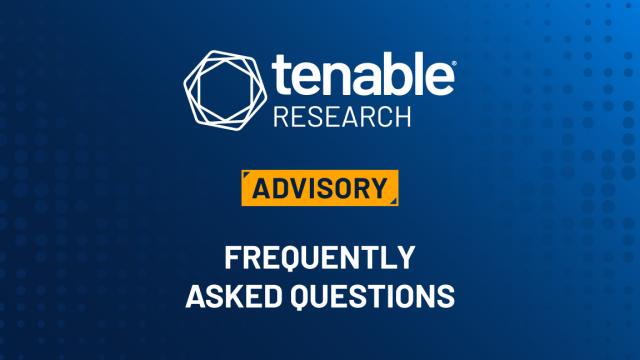CyberAlerts is shutting down on June 30th, 2025. Thank you for your support!
Example Searches:
CVE
Threat Actors
Countries
Vendors
Severity
Known Exploited

|
Description: Frequently asked questions about five vulnerabilities in the Ingress NGINX Controller for Kubernetes, collectively known as IngressNightmare.BackgroundThe Tenable Security Response Team (SRT) has compiled this blog to answer Frequently Asked Questions (FAQ) regarding IngressNightmare.FAQWhat is IngressNightmare?IngressNightmare is the name given to a series of vulnerabilities in the Ingress NGINX Controller for Kubernetes, an open source controller used for managing network traffic in Kubernetes clusters using NGINX as a reverse proxy and load balancer.What are the vulnerabilities associated with IngressNightmare?The following CVEs are associated with IngressNightmare:CVEDescriptionCVSSv3CVE-2025-1097Ingress NGINX Controller Configuration Injection via Unsanitized auth-tls-match-cn annotation8.8CVE-2025-1098Ingress NGINX Controller Configuration Injection via Unsanitized Mirror Annotations8.8CVE-2025-1974Ingress NGINX Admission Controller Remote Code Execution9.8CVE-2025-24513Ingress NGINX Controller Auth Secret File Path Traversal Vulnerability4.8CVE-2025-24514Ingress NGINX Controller Via Unsanitized Auth-URL Annotation8.8When was IngressNightmare first disclosed?Public disclosure of IngressNightmare happened on March 24 when news outlets, such as The Hacker News, began reporting on these vulnerabilities. At the time those articles were published, no patches were yet available from the Kubernetes team nor had a blog been published by the researchers who discovered these f...
CVSS: HIGH (8.8) EPSS Score: 4.82%
March 25th, 2025 (3 months ago)
|
|
CVE-2025-24514 |
Description: A security issue was discovered in ingress-nginx https://github.com/kubernetes/ingress-nginx where the `auth-url` Ingress annotation can be used to inject configuration into nginx. This can lead to arbitrary code execution in the context of the ingress-nginx controller, and disclosure of Secrets accessible to the controller. (Note that in the default installation, the controller can access all Secrets cluster-wide.)
CVSS: HIGH (8.8) EPSS Score: 26.45%
March 25th, 2025 (3 months ago)
|
|
CVE-2025-1098 |
Description: A security issue was discovered in ingress-nginx https://github.com/kubernetes/ingress-nginx where the `mirror-target` and `mirror-host` Ingress annotations can be used to inject arbitrary configuration into nginx. This can lead to arbitrary code execution in the context of the ingress-nginx controller, and disclosure of Secrets accessible to the controller. (Note that in the default installation, the controller can access all Secrets cluster-wide.)
CVSS: HIGH (8.8) EPSS Score: 26.45%
March 25th, 2025 (3 months ago)
|
|
CVE-2025-1097 |
Description: A security issue was discovered in ingress-nginx https://github.com/kubernetes/ingress-nginx where the `auth-tls-match-cn` Ingress annotation can be used to inject configuration into nginx. This can lead to arbitrary code execution in the context of the ingress-nginx controller, and disclosure of Secrets accessible to the controller. (Note that in the default installation, the controller can access all Secrets cluster-wide.)
CVSS: HIGH (8.8) EPSS Score: 4.82%
March 25th, 2025 (3 months ago)
|
|
CVE-2024-24922 |
Description: A vulnerability has been identified in Simcenter Femap (All versions < V2401.0000). The affected application contains an out of bounds write past the end of an allocated buffer while parsing a specially crafted Catia MODEL file. This could allow an attacker to execute code in the context of the current process. (ZDI-CAN-21715)
CVSS: HIGH (7.8) EPSS Score: 0.05% SSVC Exploitation: none
March 24th, 2025 (3 months ago)
|
|
CVE-2025-2231 |
Description: PDF-XChange Editor RTF File Parsing Out-Of-Bounds Read Remote Code Execution Vulnerability. This vulnerability allows remote attackers to execute arbitrary code on affected installations of PDF-XChange Editor. User interaction is required to exploit this vulnerability in that the target must visit a malicious page or open a malicious file.
The specific flaw exists within the parsing of RTF files. The issue results from the lack of proper validation of user-supplied data, which can result in a read past the end of an allocated buffer. An attacker can leverage this vulnerability to execute code in the context of the current process. Was ZDI-CAN-25473.
CVSS: HIGH (7.8) EPSS Score: 0.07%
March 24th, 2025 (3 months ago)
|
|
CVE-2024-21771 |
Description:
For unspecified traffic patterns, BIG-IP AFM IPS engine may spend an excessive amount of time matching the traffic against signatures, resulting in Traffic Management Microkernel (TMM) restarting and traffic disruption. Note: Software versions which have reached End of Technical Support (EoTS) are not evaluated
CVSS: HIGH (7.5) EPSS Score: 0.27% SSVC Exploitation: none
March 24th, 2025 (3 months ago)
|
|
CVE-2025-2749 |
Description: An authenticated remote code execution in Kentico Xperience allows authenticated users Staging Sync Server to upload arbitrary data to path relative locations. This results in path traversal and arbitrary file upload, including content that can be executed server side leading to remote code execution.This issue affects Kentico Xperience through 13.0.178.
CVSS: HIGH (7.2) EPSS Score: 0.23% SSVC Exploitation: poc
March 24th, 2025 (3 months ago)
|
|
CVE-2025-30154 |
🚨 Marked as known exploited on April 10th, 2025 (3 months ago).
Description: CISA has added one new vulnerability to its Known Exploited Vulnerabilities Catalog, based on evidence of active exploitation.
CVE-2025-30154 reviewdog action-setup GitHub Action Embedded Malicious Code Vulnerability
These types of vulnerabilities are frequent attack vectors for malicious cyber actors and pose significant risks to the federal enterprise.
Binding Operational Directive (BOD) 22-01: Reducing the Significant Risk of Known Exploited Vulnerabilities established the Known Exploited Vulnerabilities Catalog as a living list of known Common Vulnerabilities and Exposures (CVEs) that carry significant risk to the federal enterprise. BOD 22-01 requires Federal Civilian Executive Branch (FCEB) agencies to remediate identified vulnerabilities by the due date to protect FCEB networks against active threats. See the BOD 22-01 Fact Sheet for more information.
Although BOD 22-01 only applies to FCEB agencies, CISA strongly urges all organizations to reduce their exposure to cyberattacks by prioritizing timely remediation of Catalog vulnerabilities as part of their vulnerability management practice. CISA will continue to add vulnerabilities to the catalog that meet the specified criteria.
CVSS: HIGH (8.6) EPSS Score: 42.39%
March 24th, 2025 (3 months ago)
|
|
CVE-2025-30154 |
Description: reviewdog action-setup GitHub Action contains an embedded malicious code vulnerability that dumps exposed secrets to Github Actions Workflow Logs.
CVSS: HIGH (8.6) EPSS Score: 42.39%
March 24th, 2025 (3 months ago)
|
